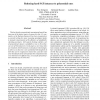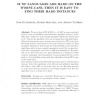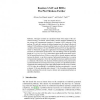88 search results - page 1 / 18 » Reducing hard SAT instances to polynomial ones |
IRI
2007
IEEE
13 years 11 months ago
2007
IEEE
This last decade, propositional reasoning and search has been one of the hottest topics of research in the A.I. community, as the Boolean framework has been recognized as a powerf...
COCO
2005
Springer
13 years 10 months ago
2005
Springer
We prove that if NP ⊆ BPP, i.e., if SAT is worst-case hard, then for every probabilistic polynomial-time algorithm trying to decide SAT, there exists some polynomially samplable ...
CC
2007
Springer
13 years 4 months ago
2007
Springer
We prove that if NP ⊆ BPP, i.e., if SAT is worst-case hard, then for every probabilistic polynomial-time algorithm trying to decide SAT, there exists some polynomially samplable ...
ACMSE
2006
ACM
13 years 10 months ago
2006
ACM
Although the satisfiability problem (SAT) is NP-complete, state-of-the-art solvers for SAT can solve instances that are considered to be very hard. Emerging applications demand t...
CP
2001
Springer
13 years 9 months ago
2001
Springer
Abstract. This paper contains an experimental study of the impact of the construction strategy of reduced, ordered binary decision diagrams (ROBDDs) on the average-case computation...



